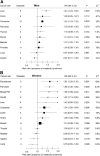Metabolic syndrome and risk of cancer: a systematic review and meta-analysis
- PMID: 23093685
- PMCID: PMC3476894
- DOI: 10.2337/dc12-0336
Metabolic syndrome and risk of cancer: a systematic review and meta-analysis
Abstract
Objective: Available evidence supports the emerging hypothesis that metabolic syndrome may be associated with the risk of some common cancers. We did a systematic review and meta-analysis to assess the association between metabolic syndrome and risk of cancer at different sites.
Research design and methods: We conducted an electronic search for articles published through October 2011 without restrictions and by reviewing reference lists from retrieved articles. Every included study was to report risk estimates with 95% CIs for the association between metabolic syndrome and cancer.
Results: We analyzed 116 datasets from 43 articles, including 38,940 cases of cancer. In cohort studies in men, the presence of metabolic syndrome was associated with liver (relative risk 1.43, P < 0.0001), colorectal (1.25, P < 0.001), and bladder cancer (1.10, P = 0.013). In cohort studies in women, the presence of metabolic syndrome was associated with endometrial (1.61, P = 0.001), pancreatic (1.58, P < 0.0001), breast postmenopausal (1.56, P = 0.017), rectal (1.52, P = 0.005), and colorectal (1.34, P = 0.006) cancers. Associations with metabolic syndrome were stronger in women than in men for pancreatic (P = 0.01) and rectal (P = 0.01) cancers. Associations were different between ethnic groups: we recorded stronger associations in Asia populations for liver cancer (P = 0.002), in European populations for colorectal cancer in women (P = 0.004), and in U.S. populations (whites) for prostate cancer (P = 0.001).
Conclusions: Metabolic syndrome is associated with increased risk of common cancers; for some cancers, the risk differs betweens sexes, populations, and definitions of metabolic syndrome.
Figures




References
-
- Alberti KGMM, Eckel RH, Grundy SM, et al. International Diabetes Federation Task Force on Epidemiology and Prevention. Hational Heart, Lung, and Blood Institute. American Heart Association. World Heart Federation. International Atherosclerosis Society. International Association for the Study of Obesity Harmonizing the metabolic syndrome: a joint interim statement of the International Diabetes Federation Task Force on Epidemiology and Prevention; National Heart, Lung, and Blood Institute; American Heart Association; World Heart Federation; International Atherosclerosis Society; and International Association for the Study of Obesity. Circulation 2009;120:1640–1645 - PubMed
-
- Renehan AG, Tyson M, Egger M, Heller RF, Zwahlen M. Body-mass index and incidence of cancer: a systematic review and meta-analysis of prospective observational studies. Lancet 2008;371:569–578 - PubMed
-
- Nicolucci A. Epidemiological aspects of neoplasms in diabetes. Acta Diabetol 2010;47:87–95 - PubMed
-
- Jafri H, Alsheikh-Ali AA, Karas RH. Baseline and on-treatment high-density lipoprotein cholesterol and the risk of cancer in randomized controlled trials of lipid-altering therapy. J Am Coll Cardiol 2010;55:2846–2854 - PubMed
Publication types
MeSH terms
LinkOut - more resources
Full Text Sources
Other Literature Sources
Medical

